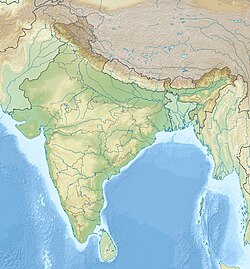This article has multiple issues. Please help improve it or discuss these issues on the talk page . (Learn how and when to remove these messages)
|
| Kunderipallam Dam | |
|---|---|
| Country | India |
| Location | Erode district, Tamil Nadu, India |
| Coordinates | 11°33′5″N77°22′0″E / 11.55139°N 77.36667°E |
| Purpose | Irrigation |
| Status | Operational |
| Construction began | 1975 |
| Opening date | 1980 |
Kunderipallam Dam is a dam located in Kongarpalayam, Gobichettipalayam Taluk, Erode district, Tamil Nadu, India. [1] Located in the southern part of a dense hill forest, it is a crucial structure for Tamil Nadu's agricultural and hydroelectric power sectors. In addition, it is valuable as a destination for international tourism due to the wide variety of both rare fish and fowl that call it home. [2]
